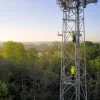LG Sets THz Distance Record with Candidate 6G Mobile Network

A team of researchers, backed by LG Electronics (LG) and the Fraunhofer-Gesellschaft research organisation, claim to have successfully demonstrated a candidate 6G mobile (mobile broadband) technology that was able to use the TeraHertz (THz) band to send data over a record outdoor distance of 100 metres.
Granted, 100 metres might not seem particularly impressive to the casual observer, but it’s actually quite a major feat. As a basic rule, lower frequency mobile spectrum bands (e.g. 700MHz) can reach further with their signals and penetrate better through walls than higher ones (e.g. 3.8GHz), but at lower frequencies there’s less spectrum spare for your data transmission (i.e. slower broadband speeds).
The idea of pushing into the THz bands with 6G is thus all about achieving incredible data speeds, with Samsung having previously indicated that they wish to target a peak (shared capacity) speed of 1Tbps (Terabits per second) and latency times of just 100 microseconds (0.1ms) for future 6G technologies (here). It sounds wonderful, yet coverage quickly becomes a major problem due to the laws of physics, but we’ll come back to that.
Advertisement
LG’s experiment is important because, until now, a similar transmission would have fizzled out over just 15 metres (Samsung’s test). The solution was to use better power amplification to generate a stable signal across ultra-wideband frequencies. The power amplifier is capable of generating stable signal output up to 15dBm in the frequency range between 155 – 175GHz.

LG was also successful in demonstrating adaptive beam forming technology, which alters the signal’s direction in accordance with changes to the channel and receiver position, as well as high gain antenna switching, which combines output signals of multiple power amplifiers and transmits them to specific antennas.
Dr. I.P. Park, President and CTO of LG Electronics, said:
“The success of this test demonstrates that we are ever closer to the successful application of terahertz radio communication spectrum in the upcoming 6G era. Our successful partnerships with local and global research institutions and organizations to advance the development of 6G capabilities have been very rewarding.”
As usual, such tests are often most notable for the bits of detail they leave out. In this case, they haven’t provided any information on how fast the data transmission was or what the weather conditions were, but we assume it was a clear sunny day. For all we know, the data speeds achieved might have only been at dialup levels.
Advertisement
The problem with all of this is that super high mobile frequencies have only very limited benefits, often via specific use cases. For example, existing 5G services also planned to use higher frequencies around 23GHz to 100GHz, but that created a clash between the laws of physics and economic reality.
At present only a few 5G operators have harnessed bands above 23GHz, and usually only in busy areas (shopping centres etc.) or for fixed wireless access (FWA) style links, because such signals are extremely weak and thus don’t travel very far. The only way to counteract that for mobile is to build a much denser and more complicated network deployment, which is extremely expensive and operators’ have thus tended to shun it.
Suffice to say that the development of 6G, by focusing so intently upon the Terahertz band, is at risk of repeating the same mistake, when it would perhaps do better to focus more of its energy on improving 5G in the under-utilised mmWave (mmW) bands first. All of this is currently the subject of some wider debate (here) and it’s not yet clear how much impact that will have on 6G development, if any.
As it stands, 6G is currently in the very early R&D phase, and it isn’t expected to become a solid standard until around 2025 (a draft standard may be defined in the 2021/22 period), with commercial launches likely to follow a few years after that. Expect the usual hype train to follow, which as with 3G, 4G and 5G before it, has often tended to be divorced from reality.
Advertisement
Mark is a professional technology writer, IT consultant and computer engineer from Dorset (England), he also founded ISPreview in 1999 and enjoys analysing the latest telecoms and broadband developments. Find me on X (Twitter), Mastodon, Facebook, BlueSky, Threads.net and Linkedin.
« Sky UK Allegedly Trial Broadband TV Service Without Satellite UPDATE
Full Fibre UK Broadband ISP Hyperoptic Launch Flash Sale »





















































My TV remote has been using Terahertz for decades to transmit data!
I bet if you put enough batteries in it, it’d reach your tv over 100m too….lol
If 6G is having that range, I’m giving up already.
This is quite interesting stuff. Fibre is a relatively controlled environment – you can fire extremely high frequencies down it, a reminder that visible light is an EM band, and not see much loss due to the medium.
We’re still a way from hitting the limits of physics in fibre but it looks as though wireless is struggling. Need more spectrum in the low-GHz range though I imagine a fair amount of that will have to be reclaimed – satellites sit there.
When “6G” reaches the UK our incumbent failing telecoms providers will still try and market us with their delightful 3Gb/month data plans.
If mobile providers completely blocked static and video adverts at source, the existing network infrastructure might actually work.
That’ll be because they’ll still not have the back-haul available to provide decent 4g speeds (100Mbps 24/7) let alone 5 or 6g by then.
Isn’t that frequency a bit more dangerous
No, it’s way.. weaker.
The way I look at it is, if you think that frequency is dangerous, you better become a vampire as visible light is stronger……
As Lister says, the THz band is incredibly weak (very easily blocked and disrupted), but the key point here isn’t so much the use of the band itself, but more how much power you put behind it and the antenna design. Mobile networks are required to operate at very low power levels, and that makes it difficult to turn such bands into an economically viable mobile communications solution.
Be all right until it rains.
6G. Can’t even get reliable 2G. High time for UK roaming to be enabled.